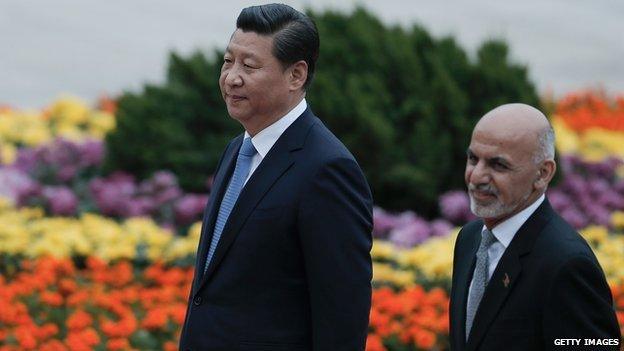China media: Afghan investment
- Published

Wooing China: President Ashraf Ghani (R) is greeted by his host, President Xi Jinping
Papers analyse China's role in the reconstruction of Afghanistan as President Ashraf Ghani arrived in Beijing on Tuesday for a four-day visit.
Mr Ghani is expected to focus on fostering closer economic ties and will attend an international donor conference on Afghanistan hosted by Beijing.
Several media outlets, external go out of their way to point out that Mr Ghani has chosen China for his first state visit after taking office in less than a month.
Afghanistan affairs analyst Shao Yuqun tells the Global Times' Chinese edition, external that the move underlines Beijing's "significant importance for the war-torn country".
He adds that the size of China's economy and its "positive image" in the region make it the ideal candidate to help stabilise Afghanistan now that US and British forces have pulled out.
In an article in the 21 Century Business Herald, external China's special envoy for Afghanistan, Sun Yuxi, is quoted as saying that Beijing's involvement in the country is "mainly commercial".
But South Asian affairs analyst Zhao Gancheng dismisses what he says are Western accusations that China has its eye on Afghanistan's mineral resources as "jealous criticism".
"The West has no right to gossip about China's assistance and investment in Afghanistan," he argues in the the Chinese edition of the Global Times, external, since US and the Nato forces "have caused massive civilian casualties, the collapse of the economy and social unrest in the country for the past 13 years".
The China Daily, external quotes Chinese foreign ministry official Kong Xuanyou as saying that the two countries have also "reached a consensus" on the need to fight the East Turkistan Islamic Movement (ETIM), a separatist group in eastern Xinjiang province, the home of the Muslim Uighur ethnic minority.
Fighting abuse of power
Closer to home, newspapers, external give prominent coverage to news that military prosecutors have indicted a former top general for bribe-taking, as President Xi Jinping's crackdown on corruption continues.
Xu Caihou, the former vice chairman of the Communist Party's powerful Central Military Commission (CMC), has admitted to accepting "extremely large" bribes and using his position to influence promotions, according to the official news agency Xinhua, external.
He has been expelled from the party and the military ahead of his trial.
"This once again shows the determination of the party to push for law-based governance and that no one is exempt from the law," the agency says in a commentary.
"Party members and cadres have to lead the way and be law abiding," it adds, and warns that the ring around those who misuse positions of power will "only become tighter".
Commentators and analysts also welcome a Communist Party document promising wide-ranging changes to the judicial system aimed at strengthening the rule of law.
In the report - adopted at a central committee meeting last week - President Xi Jinping "warned of serious problems in China's judicial system and pledged to end judicial injustice", according to Xinhua, external.
One of the planned measures will require officials to swear allegiance to the constitution, Xinhua says, adding: "The Communist Party leadership is the fundamental guarantor of the rule of law, and the constitution is the fundamental law."
Communist Party academic Zhang Xixian tells the Global Times, external he believes the move will result in the creation of a comprehensive legal system" that will end abuse of power.
According to legal analyst Yang Xiaojun, the new rules will also help market reform by clearly defining the responsibilities of government institutions.
"Creating a list of powers helps to clarify the relationship between the market and government," he tells the Global Times. "This will limit the government's power."
BBC Monitoring, external reports and analyses news from TV, radio, web and print media around the world. For more reports from BBC Monitoring, click here. You can follow BBC Monitoring on Twitter, external and Facebook, external.